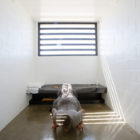
Life Sentences, Long Sentences Imposed on Youth Need 2nd Look
|
Decades of research from the fields of criminology and adolescent brain science find that the decisions made in youth — even very unwise decisions — do not...
Juvenile Justice Information Exchange (https://jjie.org/page/134/)

In late September, Torri was driving down the highway with her 11-year-old son Junior in the back seat when her phone started ringing.
It was the Hamilton County Sheriff’s deputy who worked at Junior’s middle school in Chattanooga, Tennessee. Deputy Arthur Richardson asked Torri where she was. She told him she was on the way to a family birthday dinner at LongHorn Steakhouse.
“He said, ‘Is Junior with you?’” Torri recalled.
Earlier that day, Junior had been accused by other students of making a threat against the school. When Torri had come to pick him up, she’d spoken with Richardson and with administrators, who’d told her he was allowed to return to class the next day. The principal had said she would carry out an investigation then. ProPublica and WPLN are using a nickname for Junior and not including Torri’s last name at the family’s request, to prevent him from being identifiable.
When Richardson called her in the car, Torri immediately felt uneasy. He didn’t say much before hanging up, and she thought about turning around to go home. But she kept driving. When they walked into the restaurant, Torri watched as Junior happily greeted his family.
Soon her phone rang again. It was the deputy. He said he was outside in the strip mall’s parking lot and needed to talk to Junior. Torri called Junior’s stepdad, Kevin Boyer, for extra support, putting him on speaker as she went outside to talk to Richardson. She left Junior with the family, wanting to protect her son for as long as she could ...

Decades of research from the fields of criminology and adolescent brain science find that the decisions made in youth — even very unwise decisions — do not...

It has been said that all a child needs is one caring adult in order to become a success in life. When a child is removed from home because of parental abuse or neglect...

“You never know how sacred your freedom is until it’s jeopardized.”
That’s the driving sentiment behind “Crown Heights,” a new film that tells a tale of friendship and perseverance in the face of a miscarriage of justice.
All of us during our lives as children, adolescents and eventually adults need some encouragement. As the individuals we are, we tend to learn differently, have different perspectives and take risks on different levels. For those like myself, words of encouragement were really needed in my life to fulfill my true potential in the activities that I engaged in.

I’ve spent 15 years working inside New York’s justice system, representing teenagers and doing research inside juvenile facilities. When the New York State Legislature passed legislation to raise the age of criminal responsibility from 16 to 18, I viewed this change not as resolution of a long-standing problem within New York’s justice system, but rather as a step toward needed reforms of our state’s juvenile justice system.

For more than a decade I have interviewed more than 1,000 kids in 35 states. What of these kids who were sentenced to long sentences and JLWOP, life sentences without parole? These kids become adults who become geriatric. These are the people I have interviewed for the past year.

Esteem. Eagerness. Engagement. Elation. Kids in custody become kids for a day. “Cat in the Hat” hats, beloved Dr. Seuss stories, pride to contribute, laughter, fun and the promise of a giant cupcake to celebrate the life of Dr. Seuss transform a jail into a celebration of literacy. Spirits are high, peer cooperation is contagious and childlike delight spreads across a facility often darkened by despair and disrespect.

I remember the paralyzing fear I felt when I realized I was never going home to my father again. I would never have a normal childhood. But my love for reading saved my life. Reading became my way out.